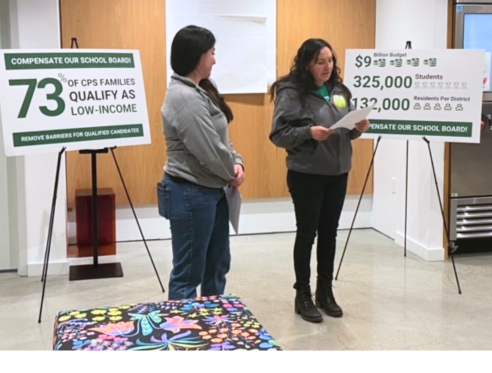
“The Evidence-Based Funding formula was Illinois’ pledge to rectify historic inequities in education. But the gap between what was sufficient in 2017 and what’s necessary now has widened — it’s time our financial commitment reflected that reality."
During his State of the State/Budget Address, Governor Pritzker proposed an increase of $350 million for the Evidence-based Funding (EBF) formula in FY25. While we are sensitive to the budgetary constraints of the year ahead and appreciate the ongoing commitment to EBF, we continue to believe the state needs to do more. The Governor has proven himself to be a champion for education, and we believe he understands that investment in EBF is directly responsible for Illinois’ better-than-average academic recovery in the wake of COVID. That said, the road ahead continues to be challenging for children and schools. An annual increase of $350M was meant as a floor, not a ceiling. As the Governor stated, “A quality education is the foundation of a good life and the cornerstone of a strong society.” But investment in education is more than the cornerstone of a strong society, it is the keystone. In FY25, amid expiring federal funds, high inflation, and perpetually under- and inequitably-funded schools, we continue to believe it is critical that the state invest more than the minimum.
The Funding Illinois’ Future Coalition comprises on-the-ground educators, providers, community leaders, parents, and more. We can report that our students’ needs have dramatically increased in the past few years, as have the costs of providing the instruction and services they require. Schools cannot continue to provide the same level of support with the same amount of funding. What could have been purchased with $350 million in 2017, when the formula was passed, now costs $437 million. “The Evidence-Based Funding formula was Illinois’ pledge to rectify historic inequities in education.” said Claiborne Wade, a Chicago Public Schools (CPS) parent, member of the FIF Coalition, and Chair of Kids First Chicago’s Equitable Funding Task Force. “But the gap between what was sufficient in 2017 and what’s necessary now has widened — it’s time our financial commitment reflected that reality.”
While districts grapple with the effects of inflation and growing needs, the last wave of short-term federal ESSER dollars, which have been a lifeline for many school districts and students and totaled more than $4.8 billion, is set to run out this fall. Without these funds and increased investment in EBF, education leaders will have to make difficult decisions about which essential learning renewal and recovery programs and services they can continue to invest in and which will have to be reduced or eliminated altogether.
Investments in our schools through EBF and investments made using federal relief funds are positively impacting students and outcomes. These investments include instructional coaches and additional teachers, especially in the younger grades, to help ensure more individualized attention. Districts have also focused on hiring more social workers, behavioral interventionists, and counselors to provide sorely needed holistic support to students, especially those who are struggling with mental health and well-being. Other investments include tutoring programs, enhanced professional development to help educators better meet the diverse needs of students, and technology to help bridge the digital divide. Dr. Carla Stewart, an Illinois mental health practitioner says, “An increase in funding will enable us to support students with special needs, offer more comprehensive mental health services, and enhance extracurricular activities that are vital for holistic development… ensuring that our schools are well-equipped is not just an investment in our children’s future, but a commitment to the advancement and well-being of our society as a whole.”
As schools recover from the pandemic, student achievement is beginning to rebound. However, it has not yet reached pre-pandemic levels in most areas, and disparities persist between poorer and wealthier school districts. All the more reason for increased investment in the Evidence-Based Funding formula; it has proven to be a successful, sustainable tool for driving resources to the most underfunded K-12 school districts and equipping them to meet student needs better. It also helps explain why Illinois is recovering more effectively from COVID-19 than other states.
But the recovery is still very much in progress. We have a long way to go to fulfill our promise of fully funding K-12 education in our state. There are currently over 1.3 million children in underfunded school districts. While EBF has made tremendous strides in improving these numbers, if we continue at our current pace, each and every one of our current K-12 students will graduate before we get our whole system to full funding.
For all these reasons and more, advocates are urging the Illinois General Assembly for an increased investment in EBF in FY25. Equity in educational opportunities are still decades away if annual state funding increases do not accelerate beyond $350 million for EBF. Schools and families across the state are pushing themselves to help students recover. They are calling on our elected officials to do the same.
Funding Illinois’ Future (FIF) is a coalition of more than 100 school districts, leaders, parents, educators, community, civic and faith-based organizations that helped fix Illinois’ school funding formula in 2017 with our advocacy for the historic implementation of the K-12 Evidence-based Funding Formula (EBF). We are now focused on the goal of equitable and adequate funding for all K-12 schools, and providing every Illinois student with the excellent education they deserve.



